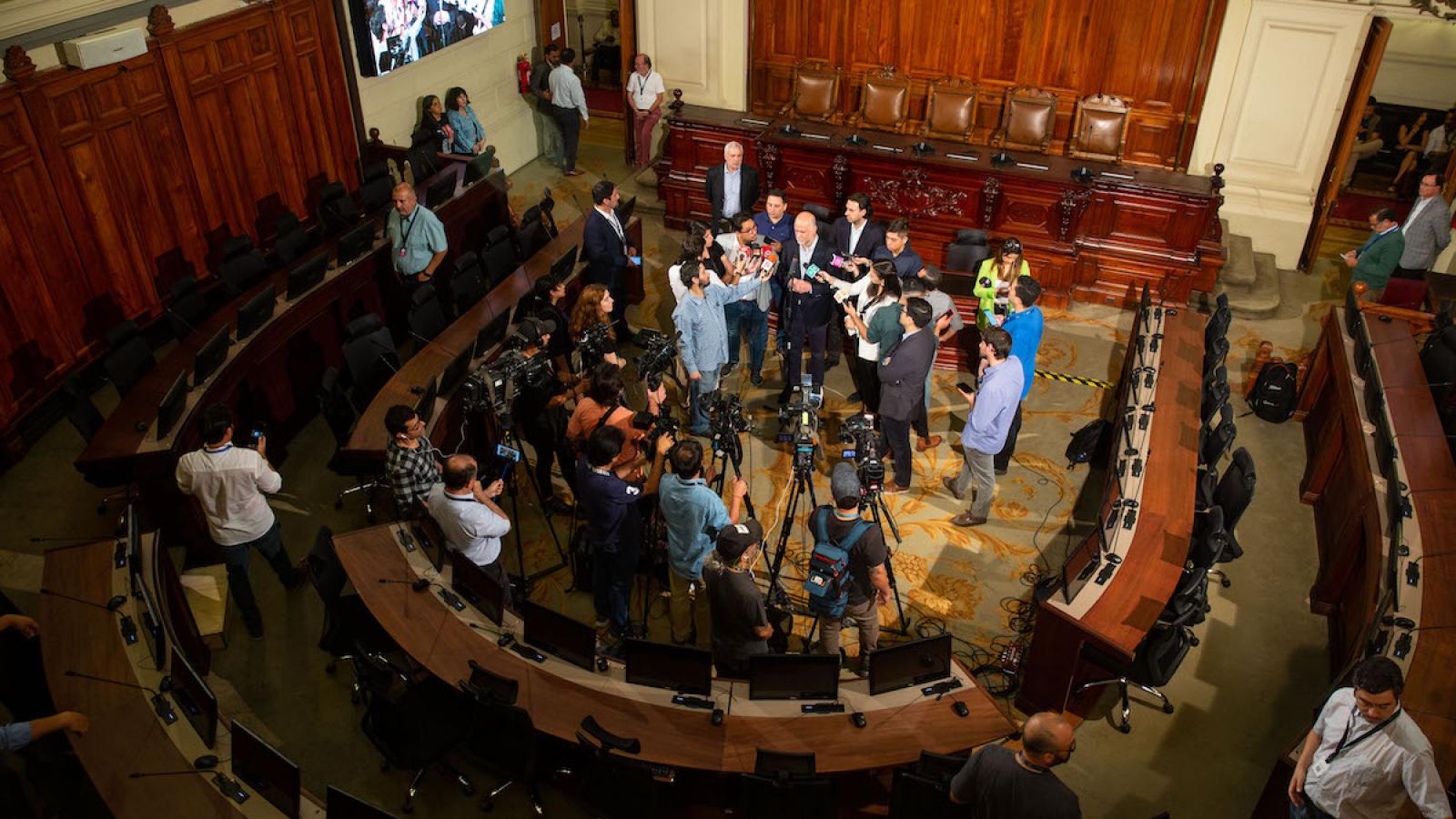Deliberating Chile's Constitutional Convention
In May of 2023, Michael Neblo got a call from Matías Díaz, a program officer from Fundación Piensa in Chile. Díaz had read Dr. Neblo’s most recent book about Deliberative Town Halls in the US and wondered if IDEA might be interested in advising them on how to adapt the process to work in Chile. Chile was trying to draft a new constitution, their third try since the end of the Pinochet dictatorship. The previous attempts had failed—one under Bachelet that stalled when Piñera took office, a second with broad participation that was rejected during Boric’s term, and a third more restricted process that was also dismissed. Fundación Piensa saw the possibility of the same thing happening this time.
"What we wanted to know was what the real, full range of voters thought," Diaz said, "and so that is why we thought that Deliberative Town Halls, which use scientifically representative samples, might be the best option for us. IDEA's Director Michael Neblo agreed, and he was excited for the chance to conduct a Deliberative Town Hall in Latin America, especially in a country like Chile."
"Chile is geographically polarized in a way somewhat similar to the US, but of course, it's also an incredibly rare research opportunity to get citizen input into the process of drafting an entirely new constitution," Neblo noted.
So, IDEA and Fundación Piensa became partners. We decided not to try to cover the entire proposal but to two events on two particularly salient clusters within it, pension reform and social rights, particularly on policies related to equal opportunity. Time was short— much of the proposal was in the early draft stage, and by the time the town halls were held and the analysis conducted, it would only be possible to get it to the constitutional delegates as they were making final revisions to the proposal the public would vote on. The plan was for both events, like all Deliberative Town Halls, to recruit a demographically representative sample of constituents, send out accessible, non-partisan background materials in advance, focus on a single issue per session, and have an independent, neutral moderator. Over the summer, the team worked with a survey firm to recruit the participants and train volunteers to help moderate the event. As revisions were being furiously made within the convention in September and October, 3400 Chilean citizens of every age, class, and region came together online with diverse delegates for the first-ever series of Deliberative Town Halls.
Chile’s First-Ever Deliberative Town Halls
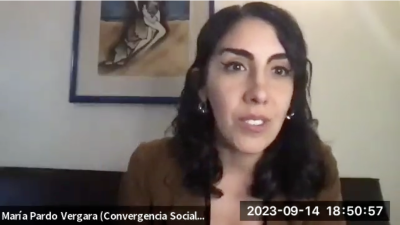
In September 2023, a representative sample of 728 citizens participated in Chile’s first-ever Deliberative Town Hall (DTH), which focused on the nation's pension system. Citizens were first surveyed on their political views and the pension system and then randomly assigned to a treatment or control group to avoid selection bias. The treatment group received neutral information about pensions and an invitation to the DTH. The DTH was hosted by a program officer at Fundacion Piensa and featured Constitutional Councilors María Pardo from Convergencia Social and Sebastián Figueroa from the Partido Republicano. Citizens posed high-quality questions such as: “How can we ensure that the new constitution is democratic and promotes citizen participation?” “How should Chile's political system be designed to ensure stability and avoid fragmentation?” and” How can the representation of women, indigenous peoples, and minorities in general be ensured in this new constitution?" "If the private system has already failed, why are we still considering a private administration system?" Another asked, "Why aren't two mechanisms created? That is, a private and individual mechanism and a shared one? And so, the citizen and/or contributor is the one who decides where to distribute their resources."
Key Findings
Chart 1: Changes in Policy Support
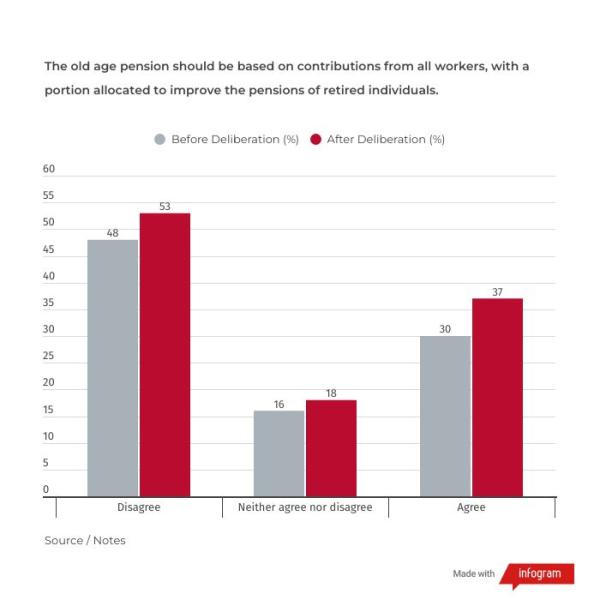
The data shows a shift in opinion from the pre-survey to the post-survey. After town hall discussions, disagreement with creating a common fund for low pensions rose from 48% to 53%, while agreement increased from 30% to 37%. These changes indicate growing support for the policy after deliberation.
Chart 2: Trust Levels Before and After the Deliberative Town Hall.
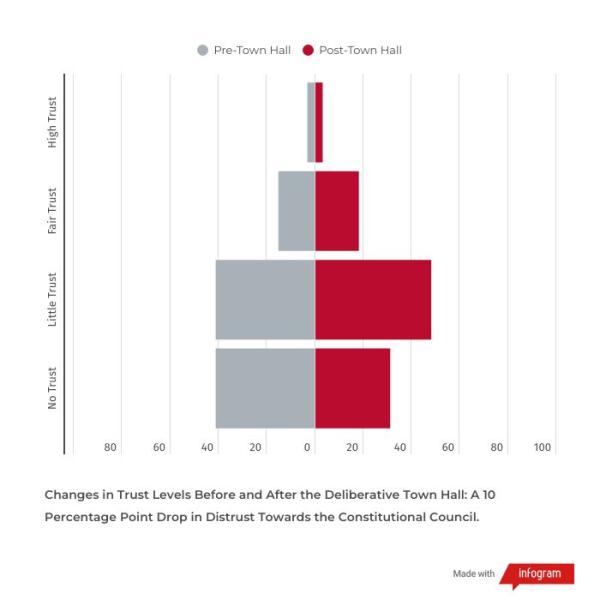
Participants' responses to a presurvey showed widespread distrust in institutions like the National Congress and the Constitutional Council. However, the DTH had a profound impact. Following the event, there was a significant drop in extreme distrust towards these institutions, with the Constitutional Council experiencing a decrease of over 10 percentage points in those reporting "no trust" at all. While many participants moved from having no trust to having little faith, this shift indicates a reduction in extreme negativity—a step toward rebuilding confidence that could be built on.
Chart 3: Participants' Perception of Information Before and After the Event
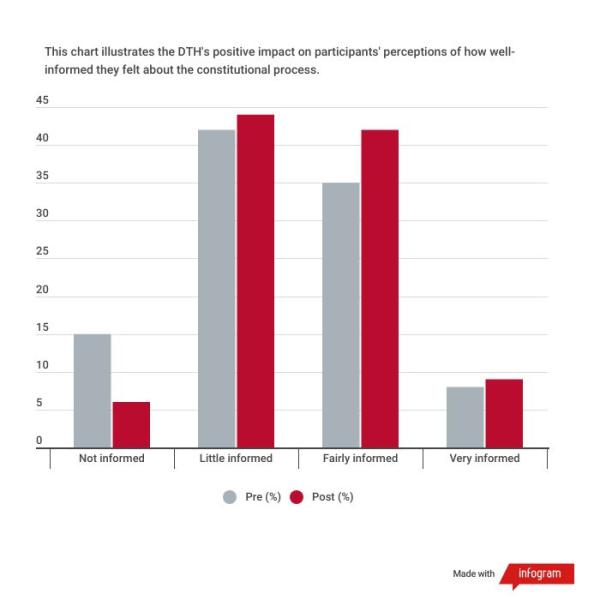
The impact of the DTH was also reflected in participants' increased understanding of the constitutional process and its importance for the country's development. The number of participants who felt "fairly informed" about the process increased by 10%, while the number of people who said, "people like me are qualified to participate in politics” increased by 6%. Though distrust has been and remains a potent force, the DTH demonstrated the power of inclusive, authentic dialogue in restoring trust in representative institutions. The event showed that when people are allowed to be heard, they can begin to trust again.
On October 16, 2023, the IDEA/Fundacion Piensa team convened a second DTH on how political rights should be guaranteed in the new constitution, this time featuring two other members of the Constitutional Council, Paloma Zúñiga of the Revolucion Democratica and Arturo Phillips of the UDI. For more than an hour, these citizens discussed the future of Chile's political system, including challenging issues like gender parity, electoral reforms, and governance structure. Despite the deep ideological divides, something incredible happened: both the participating leaders and the constituents watching, asking questions, and offering comments listened to each other. Many disagreed but did so with respect and a genuine desire to understand the other side.

Further Findings
Distrust in the Constitutional Council decreased by 15 percentage points, and people who previously felt disconnected from the political process began to feel that their voices mattered. In a particular climate of polarization, this type of event shows that citizens and politicians can disagree even on elementary issues but still have the will to reach agreements and a friendly spirit within the deliberative process.
Beyond the changes in opinion on particular policies, the event demonstrated the potential of well-designed deliberative mechanisms to heal a fractured society. In this Deliberative Town Hall, Chileans from all levels of society came together, not to shout over each other but to listen, reflect, and find common ground. And in doing so, they took a small but meaningful step toward rebuilding trust in their democracy. As the event ended, the participants left with more than a better understanding of the issues. They went with hope—a renewed belief that dialogue and progress are possible even in a polarized environment. As Manuel Diaz said --- “It was incredible to watch so many citizens engage meaningfully with their elected constituents. This is especially powerful considering our national context. There is a lot of distrust of politics in general. In the case of the last constitutional process, people didn´t feel that the process represented them and didn´t follow the previous one. This experiment shows us how you can reconnect people with politics and proves that if you gave people the right tools to participate, they would do it.”
Moving Forward
Unfortunately, the reports analyzing constituent opinion were not completed until the final week before the proposal was finalized and added to official ballots. This meant that there was no time to debate and potentially revise the proposals based on the citizen's feedback. Voters also rejected the 2023 draft of the new constitution. However, many in Chile, including Members of Congress, feel there may be opportunities to create legislation on some of the individual reforms our analysis showed to have high support.

